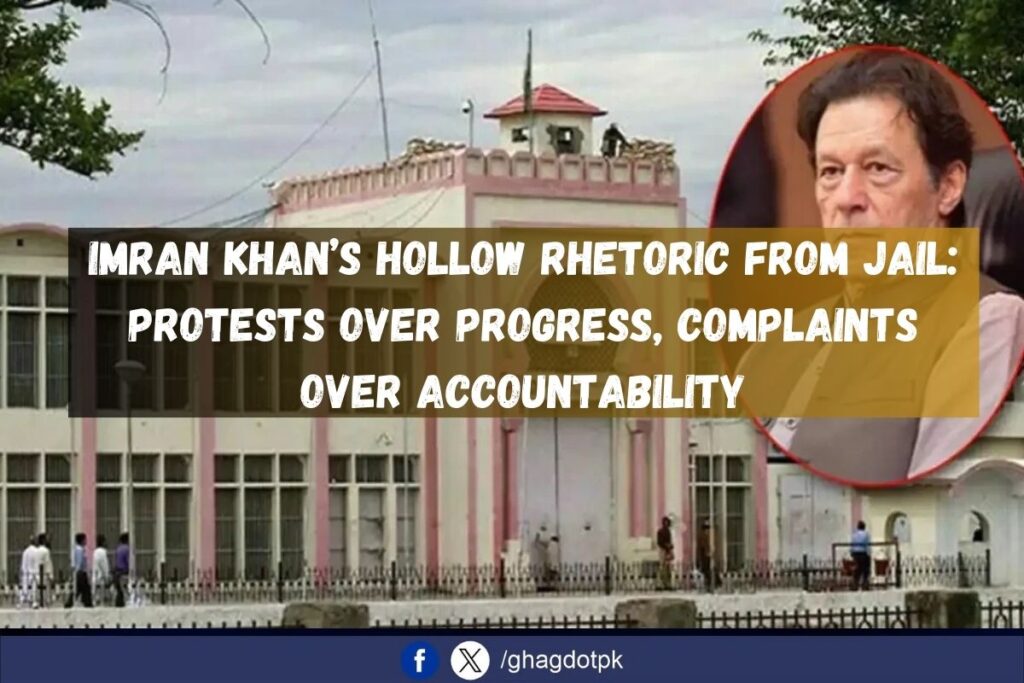Adiala Jail (Ghag Report)
The former Prime Minister and founder of Pakistan Tehreek-e-Insaf (PTI), Imran Khan, issued a series of statements from Adiala Jail, attempting to portray himself as a victim of political persecution. His remarks touched on alleged government negotiations, the judiciary, and his party’s planned protests on November 24. However, a closer look reveals contradictions, hollow claims, and an unwillingness to face accountability.
Imran Khan’s Statements
1. On Government Negotiations:
“Ali Amin Gandapur and Barrister Gohar conveyed an offer to me, suggesting that protests be postponed and everything would be resolved. I demanded the release of all under-trial detainees, including myself, to test the seriousness of the negotiations. This was a reasonable demand that could have been immediately fulfilled, but they did not do so. It is clear they only wanted the protests delayed, not a genuine resolution.”
2. On High Court Bail:
“The High Court approved my bail yesterday, yet the government refused to release me. This shows their intent to prolong matters. It is evident that the real power lies elsewhere, and they are demonstrating that they are above the law.”
3. On the Justice System:
“I remain in jail as cases are fabricated against me—60 so far. This is what defines a ‘banana republic.’ Compare this to Nawaz Sharif, who was not required to submit surety bonds, and even biometric clearance was facilitated for him at the airport.”
4. Call for Protests on November 24:
“I call upon lawyers, judges, workers, and civil society to join the protests on November 24. Overseas Pakistanis, living in free countries, will hold record-breaking protests. We understand the government’s intentions, but protests will happen, and so will negotiations. November 24’s protest is 100% certain. However, it is clear I will not be released before that date.”
5. On Negotiations and Demands:
“Political parties never close the doors to dialogue. If they are serious, they must release our people. Our charter of demands includes the release of all detainees, without which progress in talks is impossible.”
The Contradictions in Imran Khan’s Narrative
While Imran Khan frames himself as a victim, his rhetoric raises serious questions about his intentions and logic.
1. Refusing Accountability:
Imran Khan complains about 60 cases against him, yet his record reveals a pattern of avoiding legal processes throughout his political career. From court summons to arrest warrants, he has repeatedly used protests and political pressure to evade the rule of law. While claiming the judiciary is being manipulated against him, his history of influencing judges and using political office to sideline investigations into himself and his party cannot be ignored.
2. Selective Sympathy:
Khan’s repeated demand for the release of PTI detainees, including those accused of violent acts, reveals his disregard for justice. Many of these individuals face serious allegations, including attacks on state institutions. His call for their release is not about fairness but about shielding his party from accountability.
3. Hypocrisy in Protests:
While Imran Khan urges people to join protests and criticizes the government for negotiating in bad faith, his own history paints a different picture. Khan is notorious for prioritizing street agitation over governance. Protests under PTI’s banner, often marked by violence and chaos, have undermined institutions rather than strengthened them. His call for protests on November 24 is yet another example of prioritizing political theater over constructive solutions.
4. Double Standards on Negotiations:
Khan claims political parties should always leave room for negotiations, but he has consistently rejected talks unless his demands are met in full. This rigidity reflects a desire for control, not consensus. His insistence on detainees’ release as a precondition for talks exposes his lack of interest in meaningful dialogue.
5. Misleading Comparisons:
Comparing his legal situation to Nawaz Sharif’s reflects Khan’s selective memory. During his tenure as Prime Minister, he weaponized accountability institutions to target political rivals, particularly Nawaz Sharif. Khan’s current predicament is a direct consequence of his actions, as he now faces the same accountability mechanisms he once championed.
The Reality Behind the Protests
Imran Khan’s November 24 protest is less about democracy or justice and more about salvaging his political relevance. His diminishing support, compounded by internal party fractures and dwindling public sympathy, has left him desperate for a political comeback. Protests are his way of shifting the narrative from legal accountability to victimhood, but this tactic comes at the cost of national stability.
Conclusion
Imran Khan’s statements from Adiala Jail are yet another attempt to deflect blame, vilify opponents, and galvanize support through emotional appeals. However, his inability to address his party’s failures, his own role in undermining institutions, and his persistent double standards expose the hollowness of his claims. Pakistan needs responsible leadership and meaningful solutions, not empty rhetoric and perpetual protests. Imran Khan must realize that accountability applies to all, including himself.






